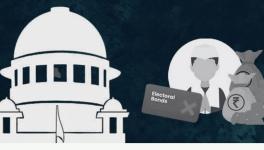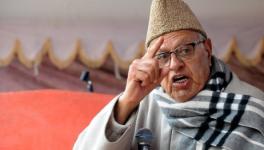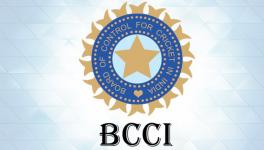IPL Cricket Scandal
Discussion on spot fixing imbroglio in IPL cricket in India and its linkage with the wider culture of lack of accountability in corporate and political governance, crony capitalism and no-holds-barred money-making in contemporary India.
Transcript:
D. Raghunandan (Raghu): Hello and welcome to Newsclick. Today we are going to discuss the goings on in the Indian Premier League of cricket, but we are going to discuss not only what's happening on the field and of the field within the theatre of cricket but try to look beyond to see what lies behind the shenanigans that we are witnessing today. And to discuss these issues we have with us today Shankar Raghuraman, Associate Editor, Times of India. Welcome Shankar.
Shankar Raghuraman (Shankar): Thanks.
Raghu: So let me start by asking you how far do you think the rot in the IPL and in Indian cricket has spread?
Shankar: Well, if we are talking only in terms of spot fixin, it's very difficult to say exactly how many people are involved, how many teams are involved, how many players, who knows how many umpires? You don’t know how far that rot has spread. But the spot fixing or the match fixing is only a symptom of a deeper malice, and that rot has clearly spread very very far. That's whole culture of anything goes; culture of let us make the rules as we go along; you know the man who controls the purse strings controls the rules. That kind of culture is quite clearly very deeply entrenched in the IPL.
Raghu: Let's start with looking at the cricket angle itself. This is not the first time we are hearing about spot fixing, we have heard about the match fixing earlier, we have had the Azharuddin controversy, we have had the Hansie Cronje story, we have had the Pakistani players in England, so this is not the first time it has happened in cricket, nor is it the first time that it has happened in sports. We have had the Serie A in Italy where more than 150 matches were believed to have been... So betting going along with fixing seems to be a part of major sporting events. Given that, can Indian cricket be far behind?
Shankar: Most certainly not. See, the moment you introduce commerce as the major angle in sports, and that is the case as you said not just in the Indian Premier league but in major league football anywhere in Europe or indeed in other parts of the world including Asia. Then there are bound to be people who will find the stakes extremely lucrative and will try and short change the system, and that's inevitable.
Raghu: This is (sic) two aspects I would like to explore because in the media debates this often comes up. One is the big distinction sought to be made between spot fixing and match fixing, and there are many experts and commentators who argue that it is almost impossible to fix a cricket match that too many people will have to be involved and therefore it is... but surely at some level spot fixing which can have an impact at the outcome of the game is equivalent to match fixing. Is it not?
Shankar: Very much so. I mean after all if a bowler has agreed to concede a certain number of runs in a particular over... Now, in the context of the match that over might turn out to be the decisive in the match.
Raghu: Especially in the 20-20 games.
Shankar: Absolutely, where a single over can change the outcome of the game. And there is no way that cricketer and that bookie can be sure that that will not affect the outcome of the game. So clearly they are not particularly bothered... their conscience isn't troubled by the fact that the outcome itself might change.
Raghu: The second aspect is that a lot of people are arguing that the role of the underground in... of the criminal underworld in Indian betting is peculiar to India and is playing such a major role because the betting is taking place underground, illegally as compared to the legal betting that takes place in Europe. Does that really influences (sic) given exactly what we have discussed about the role of fixing in European football for example?
Shankar: See, it possible to argue that if you make all betting illegal, then the underworld to a certain extent gains larger toehold, but to make to much out of that, would to my mind be very erroneous. Because after all, I mean.. you mentioned the Pakistani cricketers getting caught in England. Now, betting is legal in England. Shane Warne and Mark Waugh were fined for passing on information on pitch conditions and that kind of things to bookies. Betting is legal in Australia. So the mere fact that you legalize betting does not in any way prevent people from trying to fix outcomes or trying to fix specific details of a match.
Raghu: Okay. Let's come to the broader picture within Indian cricket itself. And you started off by saying that surely a part of the problem is the fact that Indian cricket and in particular now the IPL has shown signs of growing far too big for its boots, becoming a place where there is no accountability, where there are no rules, where things are made up as they... as you go along, and if this much money is involved in a game where there are no rules, then you are obviously opening the door to all kinds of illegalities and unethical behaviour. Could you expand on this a little bit?
Shankar: Let's start at the very top of Indian cricket. The chairman of the Board of Control for Cricket, Mr. N. Srinivasan, also happens to be an owner of a team in the IPL. Now that's a clear case of conflicts of interests. How can somebody who runs the entire tournament -- IPL after all is a subsidiary of BCCI -- how can somebody like that also be a participant in the contest itself? So that’s one clear case of conflict of interests, and there are others of a similar nature. There are commentators who are on the... who are acknowledged to be on the payroll of the BCCI.
Raghu: You are speaking about Ravi Shastri and Sunil Gavaskar.
Shankar: Absolutely. And clearly, it is a problem for them to speak out against the BCCI if they are contractually obliged to the body. Now, with this kind of conflict of interest being rampant in this thing... it breeds a culture of 'the rules are what I want them to be' and that as you said from there to illegality or criminality is a short step. Also, if you look at the IPL itself, it's more entertainment than cricket really and its acknowledged to be such. And because of that there are all kinds of people who are invited to you know fraternize with the team at the match venue itself and beyond the match venue, at post match parties and so on and so forth. Now nobody is screening who these people are... Many of them... For instance, now we know that Vindoo Dara Singh was in regular touch with the bookies and also was very comfortably ensconced within the Chennai Super Kings set up. Now with that kind of easy access of the underworld, of criminal elements to your players, to your team owners and so on. Are we... should we really be surprised at what we are now discovering? I don't think so.
Raghu: Right. And as you rightly say, there is a very thin line between the unethical and the illegal. If you had a law which said there is no conflict of interests, then you would call it illegal. Since you don't have a written law but there is an assumed standard practice of not having a conflict of interest, it's unethical practices but in other ways it could be illegal. And incidentally, when Srinivasan, if I remember right, applied first to allow his company to bid for an IPL franchise, he was then part of the Board, although not its president, and they had to do an amendment to the BCCI constitution as a one time exception to allow him...
Shankar: ...allow him to buy.
Raghu: So this shows how the whole system is being manipulated or can be manipulated.
Shankar: Absolutely. I mean what... what really is a one time exception? A one time exception means 'okay, the rule doesn't suit us in this situations, so let's get rid of the rule for a time being .'
Raghu: For you.
Shankar: Yeah. But... it's an inconvenient rule let's set it aside. That's basically what they did and that is exactly what they have been doing as they go along. I mean you look at, for instance, at the manner in which the situation regarding Sri Lankan players was dealt with. Tamil Nadu told the IPL that Sri Lankan players will not be allowed to play on any venue in Tamil Nadu. And how do you deal with it? The obvious solution would have been to say in that case let's move...
Raghu: Shift the venue.
Shankar: ...let's move games out of Tamil Nadu, but that's not how they dealt with it. The way they dealt with it was to say 'okay, when you are playing in Chennai, Sri Lankans will not play.' And that by the way, in a supreme irony, includes Muttiah Muralitharan, a Sri Lankan Tamil, allegedly the community for which all this is being done.
Raghu: And that, in fact, worked against all teams other than Chennai Super Kings since there are no Srilankans.
Shankar: None who are crucial to the team at any rate.
Raghu: In all this, something which has perhaps not caught the public attention is in the wider arena of cricket administration in this country. We've seen the Board of Control for Cricket making special exceptions for Srinivasan. There was also Krishnamachari Srikanth who was Chairman of Board of Selectors but allowed to be mentor for the Chennai Superkings. And he is now playing a mentoring role with Sunrisers Hyderabad. So a lot of cricketers are also part of this unethical set of practices. But also, cricket administrators in the state boards in which politicians rule the roost... You've got Arun Jaitley in Delhi, Narendra Modi in Gujarat. They are all part of the BCCI board. You are not hearing anything from them about unethical practices or manipulations, etc.
Shankar: Indeed. I mean the BJP will normally be jumping at the first opportunity of attacking any Congress politician. But in this case, there is Rajiv Shukla who is a minister in the government, who also happens to be the IPL Commissioner, but we haven't heard either Mr. Jaitely or Narendra Modi or indeed any other political figures involved in the world of cricket saying a word about it. And Mr. Shukla for two days after the scam broke was not to be found. You couldn't hear him, you could not see him, and nobody seems to mind because as you said they are all involved in these questionable arrangements and it doesn't suit anybody to raise a fuss about it.
Raghu: So given the extent to which big business in India and you can't get bigger than the owner of Mumbai Indians, politicians from all the major political parties and cricket authorities, legends of Indian cricket – past and present -- are involved in this unholy nexus. Is it at all possible to envisage that police investigations are likely to go anywhere with this?
Shankar: Well, we can only hope that there are some individual police officers out there who will be willing to buck powerful political figures and bring this to some kind of conclusion. But yes, it is a rather desperate hope. I mean the truth is that with so many powerful figures both from the world of business and from the world of politics, not to mention cricketers themselves who are power figures in their own right in India... with all of them being the accused as it were. It is very difficult to see the system really being able to tackle the problem.
Raghu: It's also very ironic that we are seeing today one of the strongest critiques of the current IPL administration is coming from Lalit Modi who was the former Chairman or Commissioner of the IPL, who also left the IPL under a shadow of similar peculiar doings involving the Kochi team and the Rajasthan Royals and others.
Shankar: As you said it's all... it's about cronyism. If you are not part of the crony club...
Raghu: Then you are left out.
Shankar: If you are on the outside, then you are clearly critical of the new club that's come into be.
Raghu: And you are affronted.
Shankar: You're...
Raghu: Because you are not part of this.
Shankar: And suddenly all that is wrong about this set up becomes obvious to it.
Raghu: But when you are part of it yourself...
Shankar: Oh, then it serves your purpose.
Raghu: Since you brought up this issue of cronyism, would you agree that what we are witnessing in the world of cricket is not confined to cricket but is the part of the culture of Indian business and the nexus between Indian business and politicians and the absence of any accountability and the system of accountability or ethical practices, both in corporate governance and in political governance in this country.
Shankar: If you look at all the recent scams, the fact that so many of them pertain to exploitation of natural resources – an area which has not been very strictly regulated in the past for the simple reason that it was the state which had a monopoly on extracting natural resources. Now, you have a situation today where the private corporate sector is very much part of this process but is still operating in the regime of little or no control, no regulation, and the name of the game is cronyism. So you basically try and ensure that you are on the right side of those who are in power, or that they can be paid off to do you favours. And that's... that's very much the backbone of this system that we have now ---
Raghu: Where there are no rules. But rules are made up as you go along to suit the convenience and interest of this or that...
Shankar: In this Supreme Court case on coalgate, for instance, one of the things that the CBI had to tell the court was we have not been able to find any criteria on which the allocations were done. That is basically saying that there are no rules.
Raghu: And today's paper carries a story about a potential price fixing which is going to be done...
Shankar: ...in the oil gas... in the oil and gas sector.
Raghu: in the oil and gas fields which is going to be also equally arbitrary and without any foundation whatsoever.
Shankar: Absolutely. And each of these arbitrary decisions cost the exchequer tens of thousand of crores, sometimes even hundreds of thousands of crores, and results in a corresponding benefit to the private corporate sector. With those takes you can see why there is a lot riding on this system.
Raghu: And... exactly what we've been talking about. In the field of business at large, none of these are considered to be criminal. At best they are looked at as some maleficence... somewhere where you can ask one minister to may be step out of the way and then everything goes back to everything being exactly what it was earlier.
Shankar: Yes
Raghu: And it is the same thing that is happening in cricket as well.
Shankar: Absolutely. All the questioning is really restricted to why him, why not me. I mean it's not about what is the norm, what is the rationale for this kind of allocation, should there be a more transparent method of doing thing(s). That's not really the fight. The fight is about why him, why not me
Raghu: And therefore, perhaps it is not surprising that some of the IPL franchisees, as they are called, also involve some of the big figures of Indian business who have also been in one form or another named or suspected of peculiar business dealings. One can think of Sahara Club; one can think of goings on with the Deccan Chronicle in Hyderabad; nobody still knows who is behind the Rajasthan Royals, and Mumbai Indians, I think, the less spoken of, the better.
Shankar: Oh, and you left out the Royal Challengers Bangalore. To my mind one of the instances which highlights (sic) the... you know the complete moral vacuum in which all of this is happening. Here is a man whose company is allegedly bankrupt; his airlines went phut and can't pay his employees, but you see him and his son... you know... various nubile young things...
Raghu: Enjoying good times.
Shankar: Oh, yes. Having good times as they would put it. Yes.
Raghu: Yes indeed. Therefore, what we are witnessing with the IPL in the field of cricket, where IPL was the new shining brand of cricket supposed to be tailored for the new generation and the modern era, has come to exemplify much of what we are witnessing in Indian business, in corporate business and its nexus with political governance in this country which is a lack of any norms, crony capitalism and it's the same thing which is coming to characterise. So we should not be surprised at the ills that are confronting us.
Shankar: Not at all. We have set up a new whole value system in which the only thing that counts is success and success defined very narrowly in terms how much money you make, how much power you wield. And it is understood that anything goes in the pursuit of these two goals. I mean whatever it takes to get more money and more power is legitimate, is by definition legitimate.
Raghu: So if it that applies to the chairman of the Board, or if that applies to the owner of a franchise, why should it not apply to a a player, or a baller...
Shankar: Absolutely. Who...
Raghu: ...or an umpire?
Shankar: Who at the end of the day is making a fraction of these people earn.
Raghu: So can we then conclude that all this that we are witnessing in the IPL is a symptom of a broader malaise, which can be put down to this new era where the animal spirits are supposed to be dominant driver behind success?
Shankar: Indeed. Indeed, it is very much the free play of animal spirits that we are witnessing both in the IPL and in the larger arena of business and politics.
Raghu: Thank you Shankar.
Get the latest reports & analysis with people's perspective on Protests, movements & deep analytical videos, discussions of the current affairs in your Telegram app. Subscribe to NewsClick's Telegram channel & get Real-Time updates on stories, as they get published on our website.
























